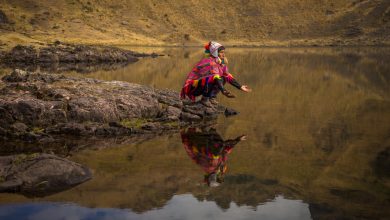Even the Rain Has Sex in Cuzco

In these months—October, November, and December, we begin the rainy season in Cuzco. As a result people prepare their gardens and fields. They often burn the weeds and leftover before turning the earth, finding their seeds, and planting them. The green sprouts of new plants are the sign of this time of year and of all the work that farmers and gardeners undertake.
To make the work more bearable and so it fits in the scheme of things, people do these projects with ayni, which is the help of friends and family. Through ayni they hope the harvest will be good. The work will be more effective this way and their efforts will duplicate, they hope, in the goods that fill their larders afterwards. In the process of work, they can never lack chicha and coca. In this way work becomes festive and the body suffers neither tiredness nor thirst.

As we know, this year in Cuzco there was a lot of rain. Almost all of the past months welcomed small rains that from time to time would drop sprinkles. Sometimes the showers were intense. Some came with sunshine and other times the Kuychi came, the rainbow. Other times it just clouded up and worried people.
It is wonderful to converse with our grandparents, all those who are older. They say that even in the rain we find a duality: the rain comes as male and female. According to the old people male rain falls hard and fast—it is not lasting—while female rain falls soft but lasts for a long time.

Laughingly, they compare this with having sexual relations. They say that the man tends to last only for a short while before having his orgasm and then it is over, while women can have various orgasms and last for a long time. That is what they say, although when you hear them laugh you know that the grandparents are a bit tricky.

In any case rain is very interesting for us. My grandmother told me that these rains have names in Quechua, our ancestral language. The strong rain is called “sinchi paray” and the light rain “sipsi paray”.
During these months we should always be prepared for rain and for the cold that accompanies it. We must always carry an umbrella or a rain poncho. You never know when the rain will start and if you are not prepared you will get soaked.




